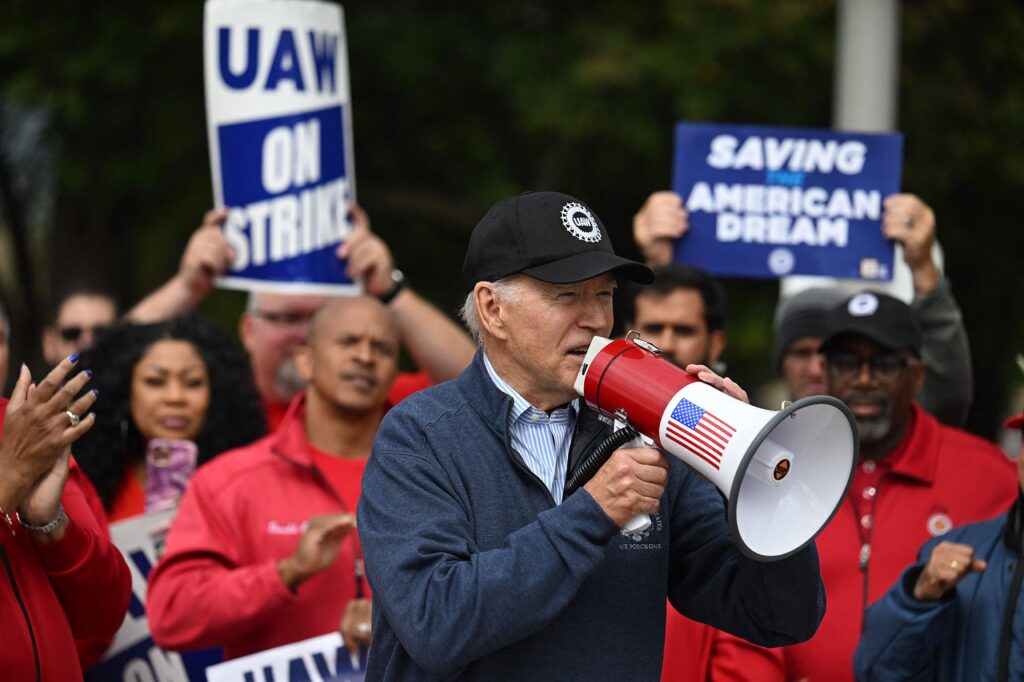He’s without a doubt the most pro-labor president in my lifetime.
Which is pretty terrible because he’s not particularly pro-labor. We’ve just had really shitty presidents.
TLDR:
-
He hasn’t done what he said he would.
-
The main points that back this is up was the small covid stimulus… You know, the one he said would be larger but then said he was counting what Trump did. And not keeping all of Trump’s political appointments.
So, the answer to the headline question is “no”. Unless you take all the credit away from the actual unions and give it to Biden for simply existing, and you’re not as old as Biden because then it would obviously be FDR
If you don’t, then he’s been exactly as pro union as every other president who wasn’t actively against unions.
Obviously this isn’t about comparing the credit Biden should get vs what unions should get, it’s comparing him to the very low bar of other US presidents.
I’d agree that FDR is the right answer if you’re old enough, but I’d say Biden probably takes it for post-FDR presidents, and definitely does for post-LBJ. Even putting aside his pro-union rhetoric or the symbolism of being the first president to walk a picket line, the improvement in NLRB policy from prior Democrats, much less Republicans, is really staggering.
it’s comparing him to the very low bar of other US presidents.
And sadly in modern history all of them that weren’t actively anti union are all sitting on the ground together right by that low bar…
None of them are above any of the others, they’re all sitting right there together at the “didn’t do shit” line, people just keep demanding we clap that Biden isn’t actively destroying the country. He’s just sitting back roasting marshmallows over the fire.
-
deleted by creator
?
he’s a fucking union buster. railroad strike?
I am not a fan of Joe Biden, but the railroad unions credit him for helping get them their sick leave.
Union leadership gives him credit, it’s members dont
Without accurate polling with statistically significant sample sizes it’s hard to tell what the whole of the unions members think of the situation. Do you have some sources for this statement?
Moreover, in the face of partisan gridlock in the Senate, Biden and his congressional allies managed to enact legislation that was celebrated for its labor-friendly provisions and capacity to generate highly-compensated and unionized blue-collar jobs. Indeed, analysts project that the 2021 Infrastructure Investment and Jobs Act, which allocates more than a trillion dollars to upgrading the nation’s roads, airports, public transit systems, and electrical grids, along with the 2022 Inflation Reduction Act, a massive federal investment in healthcare and clean energy, will together create millions of manufacturing, construction, and transportation jobs, the overwhelming majority of which will be subject to the Davis-Bacon Act’s prevailing wage mandate and many of which will be union.
To date, however, the Biden administration’s flagship labor achievements have come not through legislation but administrative action. To replace the ousted Peter Robb, Biden installed former labor lawyer Jennifer Abruzzo, who, strongly endorsed by unions, has been remarkably effective and successful and has rapidly emerged as the most pro-union GC in decades. Abruzzo has released a series of memos advising the Board to, among other things, ban captive audience meetings, expand the coverage of federal labor protections, strengthen the Board’s enforcement powers and remedial arsenal, and facilitate the union organizing process, policies which she has urged the Board to adopt in countless cases her office has prosecuted before the agency. For its part, the Board’s Democratic majority—including two Biden appointees—has proven largely receptive to the GC’s progressive proposals. The agency’s recent Cemex decision, for example, is one of several rulings and regulations the Biden Board has released to facilitate organizing and collective bargaining; it has excited labor proponents because of its potential to deter unlawful employer obstruction of organizing drives. Moreover, since Biden’s inauguration the NLRB has intensified its processing of ULP charges and election petitions—and unions have prevailed in a higher percentage of those proceedings.
Beyond his legislative and administrative agenda, Biden has consistently used his office to express solidarity with unions and enlarge their role in the public imagination. He has deployed impressively pro-union rhetoric throughout his presidency—far more than any of his recent predecessors—to rally support for organized labor and underscore its centrality to an egalitarian and democratic society. Biden criticized Kellogg’s use of permanent replacements in 2021, for example, and in 2022 he publicly encouraged efforts to organize Amazon. Most dramatically, the President, in a historical first, joined striking UAW workers on a picket line last month.






